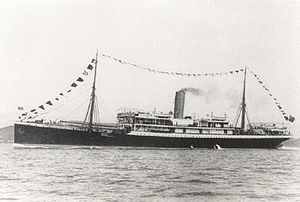SS Mendi

Mendi dressed overall
|
|
| History | |
|---|---|
|
|
|
| Class and type: | passenger liner |
| Name: | Mendi |
| Namesake: | Mendi people of West Africa |
| Owner: | British and African Steam Navigation Company Ltd, Liverpool |
| Operator: | Elder Dempster & Co, Liverpool |
| Builder: | Alexander Stephen and Sons |
| Yard number: | 404 |
| Launched: | 19 June 1905 |
| Fate: | Requisitioned 1916 |
|
|
|
| Reclassified: | troopship |
| Fate: | Sank after collision on 21 February 1917 |
| General characteristics | |
| Tonnage: | 4,230 GRT, 2,639 NRT |
| Length: | 370.2 ft (112.8 m) |
| Beam: | 46.2 ft (14.1 m) |
| Depth of hold: | 23.3 ft (7.1 m) |
| Propulsion: | triple expansion steam engine |
| Speed: | 11.5 knots (21.3 km/h) |
SS Mendi was a British 4,230 GRT passenger steamship that was built in 1905 and, as a troopship, sank after collision with great loss of life in 1917.
Alexander Stephen and Sons of Linthouse in Glasgow, Scotland launched her on 18 June 1905 for the British and African Steam Navigation Company, which appointed group company Elder Dempster & Co to manage her on their Liverpool-West Africa trades. In 1916 during the First World War the UK Admiralty chartered her as a troopship. On 21 February 1917 a large cargo steamship, Darro, collided with her in the English Channel south of the Isle of Wight. Mendi sank killing 646 people, most of whom were black South African troops. The sinking was a major loss of life for the South African military, and was one of the 20th century's worst maritime disasters in UK waters.
Mendi had sailed from Cape Town carrying 823 men of the 5th Battalion the South African Native Labour Corps to serve in France. She called at Lagos in Nigeria, where a naval gun was mounted on her stern. She next called at Plymouth and then headed up the English Channel toward Le Havre in northern France, escorted by the Acorn-class destroyer HMS Brisk.
...
Wikipedia
